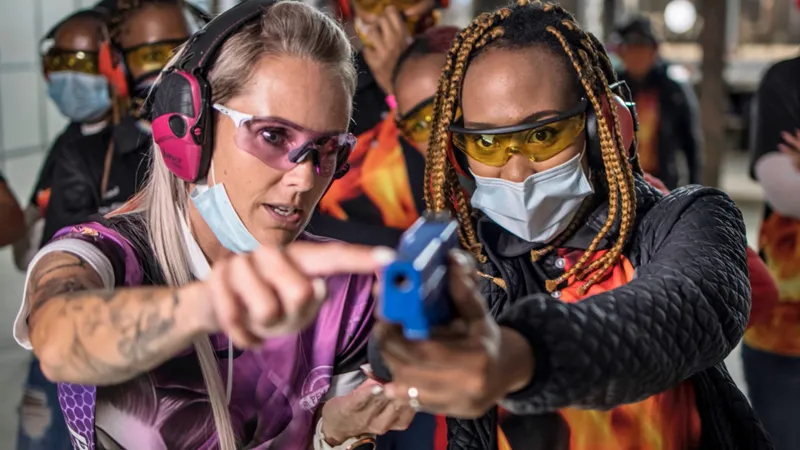South Africa’s Gun Predicament: A Deep Dive
In the bustling streets of Johannesburg, South Africa, Penson Mlotshwa has become accustomed to an unusual accessory: a firearm. For six years now, it has been his constant companion, accompanying him on routine outings to the shops, restaurants, and even the gym. In a nation grappling with soaring crime rates, Mlotshwa’s gun symbolizes a grim reality—a necessity for personal safety in the face of rampant lawlessness.
Mlotshwa, a YouTube content creator, candidly shares his experiences, highlighting the unpredictability of potential threats. “I’m not a fortune teller,” he remarks soberly, recounting instances where he’s had to draw his weapon to fend off attackers. One such encounter involved a knife-wielding assailant, swiftly disarmed without the need for gunfire.
His sentiments echo those of many South Africans who feel let down by law enforcement and government efforts in tackling crime. Lynette Oxley, a resident of Johannesburg and founder of Girls on Fire, an organization advocating for women’s self-defense through firearm training, embodies this sentiment. For her, investing in firearms outweighs the allure of material possessions—a reflection of the grim reality faced by many in a country plagued by violence.
Girls on Fire primarily assists women who have suffered various forms of violence, including rape and robbery. Oxley’s resolve stems from a deep-seated belief that personal safety is a responsibility individuals must shoulder themselves, given the apparent inadequacies of state protection.
Statistics paint a stark picture: with over 2.7 million legal gun owners and a rising demand for firearms, South Africans are increasingly taking security matters into their own hands. The surge in gun ownership coincides with a disconcerting rise in violent crime, where firearms often feature as the weapon of choice.
The prevalence of illegal firearms exacerbates the situation, with some 2.35 million estimated to be in circulation, many originating from corrupt elements within law enforcement—a troubling reality exemplified by the case of ex-police officer Christiaan Prinsloo.
Despite stringent regulations governing gun ownership, including age requirements and mental competency assessments, the allure of self-defense prompts a surge in license applications. This worrying trend is met with apprehension from activists like Adele Kirsten, who advocate for stricter gun control measures to curb escalating violence.
For Gideon Joubert, a firearms consultant, owning a gun signifies empowerment—a means for individuals to reclaim agency over their safety in a nation grappling with insecurity. Reflecting on South Africa’s complex history, shaped by colonialism and apartheid, the firearm serves as both a tool for protection and a symbol of defiance against a backdrop of pervasive fear.
As South Africans navigate a landscape fraught with uncertainty, characterized by a legacy of violence and mistrust, the debate surrounding gun ownership underscores deeper societal fissures and the enduring quest for security in an ever-changing world.












